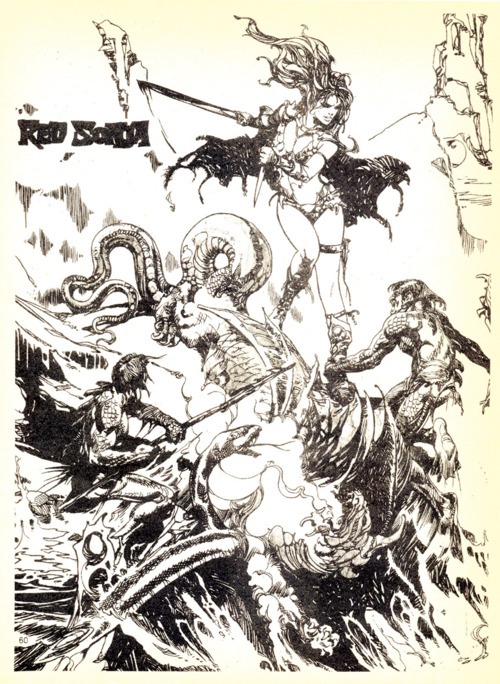 Sword & Sorcery has become a term of derision since the 1980s. There are good reasons for this but much of that derision is out of ignorance. The barbarian baby has been thrown out with the Hyborian bath water. This blog will outline the history of S&S, its major players, its ups and downs, and hopefully at the end, show why the term has become a euphemism for “bad Fantasy”, which is incorrect. There is good S&S and there is bad. The good stuff these days usually hides by calling itself something else.
Sword & Sorcery has become a term of derision since the 1980s. There are good reasons for this but much of that derision is out of ignorance. The barbarian baby has been thrown out with the Hyborian bath water. This blog will outline the history of S&S, its major players, its ups and downs, and hopefully at the end, show why the term has become a euphemism for “bad Fantasy”, which is incorrect. There is good S&S and there is bad. The good stuff these days usually hides by calling itself something else.
The term “Sword & Sorcery” was coined in April 1961 by Fritz Leiber. In the discussion letters of the Amra fanzine (published by George H. Scithers from 1959 to 1982), Michael Moorcock wanted a name for the branch of Fantasy fiction that featured heroes fighting against sorcerers and such, descended from the works of Robert E. Howard in the 1930s. Leiber mutated the expression “Sword & Sandle” (a type of historical movie) to “Sword & Sorcery”, which not everybody agreed with. L. Sprague de Camp preferred the slight variation of “Swordplay & Sorcery” (not as catchy) and even to the present day a writer like Charles Saunders uses “Sword & Soul” to mark his own brand of the sub-genre. One snarky critic in the 1970s labelled it “Tits & Daggers”, but if you look at a few Frazetta covers you’ll see that’s not entirely inaccurate either.
 The importance of the naming of Sword & Sorcery was first: writers and readers were recognizing that S&S was different from other branches of Fantasy, from children’s fiction such as C. S. Lewis’s Narnia , and from other forms of “heroic fantasy” such as that of J. R. R. Tolkien. Secondly, it also demonstrated that S&S wasn’t just the work of one author (Robert E. Howard) but a solidified sub-genre that others could write, wanted to write, explore with their own style of heroic tales. That Fritz Leiber should be chosen to name S&S is appropriate for on one did more to carry S&S through the 1940s and 1950s, writing more S&S in these lean years than anyone else.
The importance of the naming of Sword & Sorcery was first: writers and readers were recognizing that S&S was different from other branches of Fantasy, from children’s fiction such as C. S. Lewis’s Narnia , and from other forms of “heroic fantasy” such as that of J. R. R. Tolkien. Secondly, it also demonstrated that S&S wasn’t just the work of one author (Robert E. Howard) but a solidified sub-genre that others could write, wanted to write, explore with their own style of heroic tales. That Fritz Leiber should be chosen to name S&S is appropriate for on one did more to carry S&S through the 1940s and 1950s, writing more S&S in these lean years than anyone else.
Now armed with a name, S&S was ready to blossom in the 1960s, to find its way into comics, films, cartoons, video games, role-playing games, even Rock music. The boom would be followed by a bust that would see the 1990s devoid of open S&S except the Conan pastiches and television shows such as Xena, Warrior Princess. This would last until the middle of the new decade when a S&S revival took place and is still going.
 Whether you think you love or hate Sword & Sorcery, whether you know its heroes, Conan, Kull, Jirel, Elak, Fafhrd & Grey Mouser, Elric, Brak, Dilvish, etc., or not, there is one thing you cannot deny: S&S is fun. For that is how it was conceived, and how it has been written since. It can do many things, but it is always entertainment, colorful, exciting, otherworldly, brash, violent, sensual, at times kinky and weird. Never a dull moment. I hope you’ll join me on this long exploration of tales of swords and fire, sorcery and magic.
Whether you think you love or hate Sword & Sorcery, whether you know its heroes, Conan, Kull, Jirel, Elak, Fafhrd & Grey Mouser, Elric, Brak, Dilvish, etc., or not, there is one thing you cannot deny: S&S is fun. For that is how it was conceived, and how it has been written since. It can do many things, but it is always entertainment, colorful, exciting, otherworldly, brash, violent, sensual, at times kinky and weird. Never a dull moment. I hope you’ll join me on this long exploration of tales of swords and fire, sorcery and magic.










Recent Comments